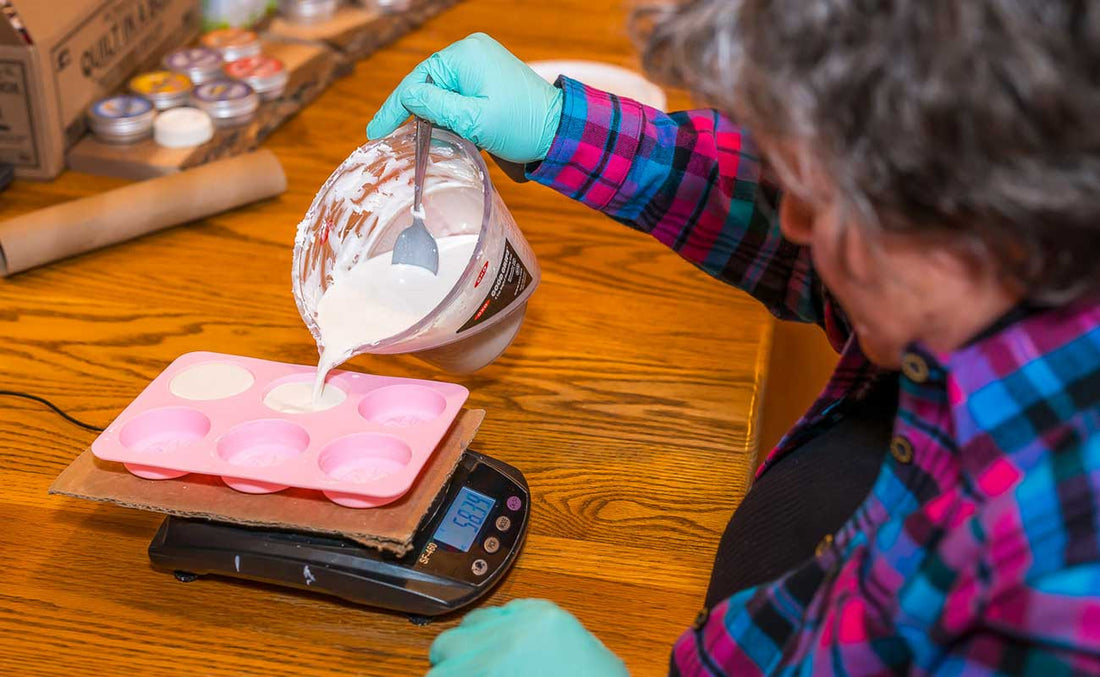
Meet the Maker: Wendy Mackenzie, Herbalist
Share
“I'm happy to say a dog ate one of these and it lived. So that's a good sign,” says Wendy Mackenzie, herbalist, retired teacher, and owner of Everlasting Herb Farm in Peacham, Vermont.

She was talking about one of her all-natural deodorant bars, Meadow Bee Deodorant, which last year won two international awards in the Beauty ShortList Award Competition. “This doesn't have bad stuff in it,” she says. “No PFAs, no aluminum. It's got like mango butter and tapioca starch.” She does admit, however, that the dog’s owner “was a little bit panicked for about 24 hours,” but the dog was fine.
Wendy’s passion for making things from the fruits of her garden stretches back over two decades. And how she turned it into a business was a happy accident.

By 2012, she had been making salves for some time. That summer, she was sitting around on vacation with an old friend at a cabin in New Hampshire. The friend was looking at a large, nationally-distributed catalog and said, “They sell things like what you make, but they don't sell exactly what you make. You should send them some of your products.” And Wendy said, “I smiled at her and I said, ‘That's a great idea.’ And in my head I thought, ‘That's the dumbest thing I've ever heard, because I have three kids, a full-time job.’”
But then, the next week there was an ice day, meaning no school (she was a teacher at the time), so she took every product she made and “did what you never should do: I put 'em all in a box, nothing fancy, and I didn't address it to anybody specifically... And I just sent it off." Four days later, she was talking to a woman from the catalog company, who said, ‘I don't know who you are, but the stars are lined up for you.’ And I started white labeling… They would just throw me products, can you do this? Can you do that? And I would do it. And then they would say yes or no.”

It turned into a busy side hustle, and it was successful enough that Wendy could leave her teaching career early, in 2018, when the school was looking to make some budget cuts. In fact, the business had grown so much that her business partner and husband, Matthew Langham, built a barn to house the business.
Then came Covid.

During the pandemic, a neighbor who had suffered a stroke asked Wendy if she could make her a cream deodorant that could be applied more easily than a traditional stick.
“At the time,” she says, “I didn't know there was such a thing as a cream deodorant, and I had worn natural deodorant all the time as an adult, but it never worked. So I understand what people are thinking when I say I'm selling a natural deodorant. They look at me.’ Yeah, right lady.’ So I just set out to help her, and it was a two year journey.”
Being that there was a pandemic on “we had all the time in the world,” Wendy said, and she decided to try to solve the problem using all the materials she had in her current herbalist and natural body products “kitchen.” She wanted to make a hard deodorant that worked, and that could be shipped to Arizona in summer, so she did a deep dive into all things deodorant and turned herself and husband Matthew into test subjects. She took courses, tested, learned some more, and finally came up with a formulation that ticked all the boxes.

“The deodorant, believe it or not, has nine ingredients. That's it,” she says. “The cool thing is, the reason why it works is it has an ingredient from the castor plant. So it's eight plant-based ingredients plus zinc oxide, and the zinc is in there – it helps with the odor a little bit, but it's mostly just gentle and great to the skin.”
And so it was that her gentle on skin (and clothing) product won the two awards noted last year, despite going up against the big firms like Proctor and Gamble and Burt’s Bees. The product has a two year shelf life and lives and ships in a recyclable container (no plastic).

Each scent of the deodorants (available as bars or creams) is named for and decorated with an image of a solitary pollinator – of which there are apparently 281 in Vermont. “The honeybees make honey,” Mackenzie explains, ”which is great, but solitary pollinators make our food. So they make one third of every bite of food that we use.”
And the latest news is that, a few weeks ago, Everlasting Herb Farm won Vermont’s Prize for Micro Enterprise of the Year (meaning they have less than five employees). But “micro” is no reflection on the firm’s performance. It is growing fast and is, Wendy said, about halfway to her hoped-for sales goal.

Everlasting Herb Farm’s products can mostly be found in co-ops and natural food stores, where the clients are already going to be more accepting of an alternative sort of beauty product, and on her website, of course.
Just please don’t let your dogs try them.
The Vermont Maker Project
Telling stories about makers across the state of Vermont. Photographed and written by StoryWorkz. Learn more at vermontmakerproject.com.
Vermont makers wear Vermont Flannel.
